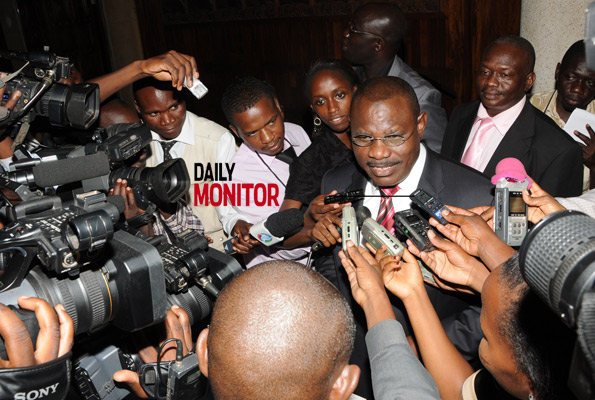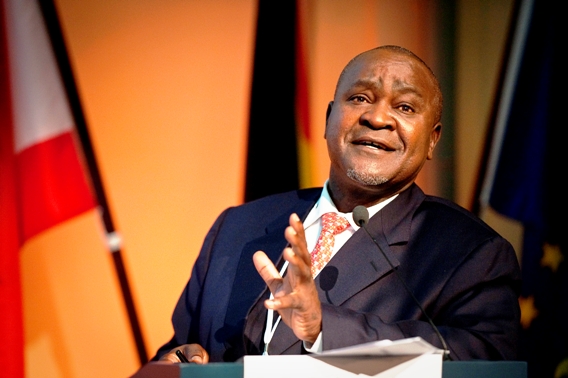Wagging tongues have it that a long time ago during the Idi Amin years, a certain young businessman with a penchant for gold neck chains and bravado was a regular visitor to Mary Stuart Hall in Makerere University where the future Vice President of Uganda, Specioza Wandera Kazibwe was studying medicine. This young businessman later started a supermarket, an electronics store and a forex bureau all pioneering businesses in Kampala. He also doubled in politics and came to represent Uganda’s can do spirit, something that endeared him initially to the city’s underclass. As a politician, populism was his trademark. In the Presidential campaign 2011, the same individual, Al Haj Nasser Ntege Ssebagala became a lynchpin, to the Elect Museveni Task Force. Speaking the language of self-interest to local elites across the country he made an effort that was valuable enough that the President appointed him Minister, an honored member of cabinet.
Members of Parliament have rejected him. They should probably think twice. One of the reasons offered for refusing Ssebagala a position at the High Table is that he is not morally sound. After all he had served time in a US jail for cheque fraud. Others argue that he cannot speak English.
All of these reasons aught to be important. English is the national language and language of government business. However Al Haj Ssebagala in this sense should perhaps simply be reason for some reflection on the state of formal education. Successive studies show that while Uganda has one of the largest pupil numbers in East Africa, over half fail numeracy and written English skills. These pupils are in all constituencies represented in Parliament which is the repository of all types and shades of Ugandans.
On a different note, Parliament should approve Ssebagala for the following reasons. Firstly because he is populist. In the run-up to the election most predictions were that there would be violence if only because the President was on a losing streak of ten percentage points since 1996 when he won by over 70 percent. Conventional wisdom was that the NRM would engage in massive rigging backed up by unbridled use of violence.
This did not occur in part because Campaign M7, with Ssebagala in tow, chose a different tact, one of cash-fueled persuasion, concerts and as some in the Opposition have pointed out bribery. Regardless of how one looks at it, and post-election violence notwithstanding, this change of tactic delivered a victory at the ballot. If his ascension to cabinet is the result of his contribution to the campaign he certainly as earned it and should not be punished for it.
Secondly Ssebagala’s preference of dealing with opponents, switching parties and putting interest before principle is not totally a bad thing in today’s Uganda. The alternative actually is not the lack of principle but something more sinister; blind loyalty.
Having him in cabinet may be useful because he is not one to resort to violent alternatives in a country that is reeling from political violence of one sort or another. Rather than view him as an object of condescension Mps should look to him as a potential ally.
It’s disturbing that the two reasons advanced to block his appointment are moralisng standards that few Mps hold themselves accountable to. Already Mps are discussing an increase in their own salaries and benefits, many engaged in bribery in their own constituencies some of which had the most violent episodes of political competition in the last election.
Outside Parliament to the elite that did not engage in politics or the vote, Ssebagala is an object of derision. But many an elite will not get their hands dirty for principle or otherwise. Why transfer their middle-class frustrations on a man long accustomed to pulling himself up by the bootstraps, firstly to overcome a language not his native tongue and in business against rules he did not make? I am no fan of Ssebagala. Like others I argue that Uganda can do better and if I had a choice in the matter, he would not be in cabinet. But the reasons advanced for his exclusion belie a certain hypocrisy, which is objectionable in and of itself. Parliament is the source of many moral crimes. Laws have been passed in the house that are retrogressive and the house as a body has been a poor countervailing force against executive excess to the point that it is not the most relevant institution for change anymore if it ever was.
In fact Ugandans took to the streets after an election to seek change outside the political process itself. If Parliament cannot hold itself to high standards it should not hold its nose at a man who has earned his keep politically. Ssebagala is a Ugandan story worthy of more than pontification by representatives who gladly put principle aside when it suits them.
At least with him we have in black and white if not in perfect English where he stands.










